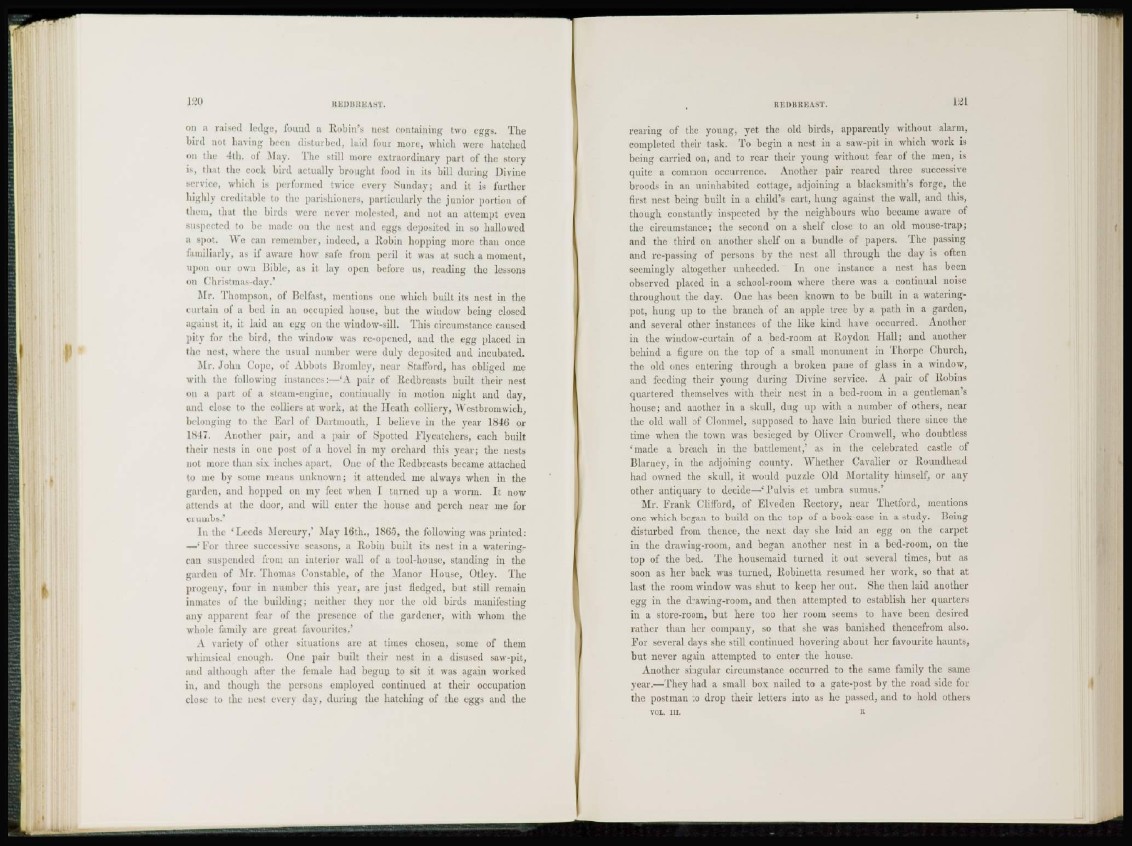
00 S raised ledge, found u Robin's nest containing two eggs. The
bird not having been disturbed, laid four more, which were hatched
on the 4th. of May. The still more extraordinary part of the story
is, that the cock bird actually brought food in its bUl during Divine
service, which is performed twice every Sunday; and it is further
highly creditable to the parishioner-;, particularly the junior portion of
them, that the birds were never molested, and not an attempt even
suspected to be made on the nest and eggs deposited in so hallowed
a spot. We can remember, indeed, a Robin hopping more than once
familiarly, as if aware how safe from peril it was at such a moment,
upon our own Bible, as it lay open before us, reading the lessons
on ('hrist mas-day.'
Mr. Thompson, of Belfast, mentions one which built its nest in the
curtain of a bed in an occupied house, but the window being closed
against it, it laid an egg on the window-sill. This circumstance caused
pity for the bird, the window was re-opened, and the egg placed in
the nest, where the usual number were duly deposited and incubated.
Mr. John Cope, of Abbots Bromley, near Stafford, has obliged me
with the following instances;—'A pair of Redbreasts built their nest
on a part of a steam-engine, continually in motion night and day,
and close to the colliers at work, at the Heath colliery, Westbromwich,
belonging to the Earl of Dartmouth, I believe hi the year 1846 or
1S4T. Another pair, and a pair of Spotted Ely-catchers, each built
their nests in one post of a hovel in my orchard this year; the nests
not more than six inches apart, One of the Redbreasts became attached
to me by some means unknown; it attended me always when in the
garden, and hopped on my feet when I turned up a worm. It now
attends at the door, and will enter the hou&e and perch near me for
crumbs.1
In the "Leeds Mercury/ Maylb'th., 1865, the following was printed:
—'For three successive seasons, a Robin built its nest in a wateringcan
suspended from an interior wall of a tool-house, standing in the
garden of Mr. Thomas Constable, of the Manor House, Otley. The
progeny, four in number this year, arc just fledged, but still remain
inmates of the building; neither they nor the old birds manifesting
any apparent tear of the presence of the gardener, with whom the
whole family are great favourites.'
A variety of other situations are at times chosen, some of them
whimsical enough. One pair built their nest in a disused saw-pit,
and although after the female had begun, to sit it was again worked
in, and though the persons employed continued at their occupation
close (o the nest every day, during the hatching of the eggs and the
rearing of the young, yet the old birds, apparently without alarm,
completed their task. To begin a nest in a saw-pit in which work is
being carried on, and to rear their young without fear of the men, is
quite a common occurrence. Another pair reared three successive
broods in an uninhabited cottage, adjoining a blacksmith's forge, the
first nest being built in a child's cart, hung against the wall, and this,
though constantly inspected by the neighbours who became aware of
the circumstance; the second on a shelf close to an old mouse-trap;
and the third on another shelf on a bundle of papers. The passing
and re-passing of persons by the nest all through the day is often
seemingly altogether unheeded. In one instance a nest has been
observed placed in a school-room where there was a continual noise
throughout the day. One has been known to be built in a wateringpot,
hung up to the branch of an apple tree by a path in a garden,
and several other instances of the like kind have occurred. Another
in the window-curtain of a bed-room at Roydon Hall; and another
behind a figure on the top of a small monument in Thorpe Church,
the old ones entering through a broken pane of glass in a window,
and feeding their young during Divine service. A pair of Robins
quartered themselves with their nest in a bed-room in a gentleman's
house; and another in a skull, dug up with a number of others, near
the old wall of Clonmel, supposed to have lain buried there since the
time when the town was besieged by Oliver Cromwell, who doubtless
' made a breach in the battlement,' as in the celebrated castle of
Blarney, in the adjoining county. Whether Cavalier or Roundhead
had owned the skull, it would puzzle Old Mortality himself, or any
other antiquary to decide—' l'ulvis et umbra sumus.'
Mr. Frank Clifford, of Elveden Rectory, near Thetford, mentions
one which began to build on the top of a book-case in a study. Being
disturbed from thence, the next day she laid an egg on the carpet
in the drawing-room, and began another nest in a bed-room, on the
top of the bed. The housemaid turned it out several times, but as
soon as her back was turned, Robinetta resumed her work, so that at
last the room window was shut to keep her out. She then laid another
egg hi the drawing-room, and then attempted to establish her quarters
in a store-room, but here too her room seems to have been desired
rather than her company, so that she was banished thencefrom also.
For several days she still continued hovering about her favourite haunts,
but never again attempted to enter the house.
Another singular circumstance occurred to the same family the same
year.—They had a small box nailed to a gate-post by the road side for
the postman to drop their letters into as he passed, and to hold others
VOL. III. II